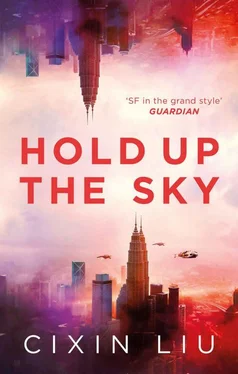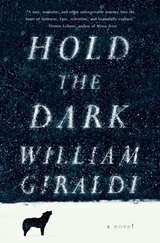Лю Цысинь - Hold Up the Sky
Здесь есть возможность читать онлайн «Лю Цысинь - Hold Up the Sky» весь текст электронной книги совершенно бесплатно (целиком полную версию без сокращений). В некоторых случаях можно слушать аудио, скачать через торрент в формате fb2 и присутствует краткое содержание. Город: London, Год выпуска: 2020, ISBN: 2020, Издательство: Head of Zeus, Жанр: Фантастика и фэнтези, на английском языке. Описание произведения, (предисловие) а так же отзывы посетителей доступны на портале библиотеки ЛибКат.
- Название:Hold Up the Sky
- Автор:
- Издательство:Head of Zeus
- Жанр:
- Год:2020
- Город:London
- ISBN:978-1-83893-763-8
- Рейтинг книги:4 / 5. Голосов: 1
-
Избранное:Добавить в избранное
- Отзывы:
-
Ваша оценка:
- 80
- 1
- 2
- 3
- 4
- 5
Hold Up the Sky: краткое содержание, описание и аннотация
Предлагаем к чтению аннотацию, описание, краткое содержание или предисловие (зависит от того, что написал сам автор книги «Hold Up the Sky»). Если вы не нашли необходимую информацию о книге — напишите в комментариях, мы постараемся отыскать её.
Hold Up the Sky — читать онлайн бесплатно полную книгу (весь текст) целиком
Ниже представлен текст книги, разбитый по страницам. Система сохранения места последней прочитанной страницы, позволяет с удобством читать онлайн бесплатно книгу «Hold Up the Sky», без необходимости каждый раз заново искать на чём Вы остановились. Поставьте закладку, и сможете в любой момент перейти на страницу, на которой закончили чтение.
Интервал:
Закладка:
“Extraction is accomplished through a series of holes drilled from the surface to the seam, using existing oil drills. These holes have the following effects: First, they distribute a large number of sensors into the seam. Second, they ignite the subterranean coal. Third, they inject water or steam into the seam. Fourth, they introduce combustion air into the seam. Fifth, they remove the gasified coal.
“Once the coal is ignited and comes into contact with the steam, the following reactions occur: Carbon reacts with water to produce carbon monoxide and gaseous hydrogen, and carbon dioxide and hydrogen; then carbon and carbon dioxide react to form carbon monoxide; and carbon monoxide and water react to form more carbon dioxide and hydrogen. The ultimate result is a combustible gas akin to water gas, with a combustible portion consisting of fifty percent hydrogen and thirty percent carbon monoxide. This is the coal gas we will obtain.
“Sensors transmit burn and production conditions of all combustible gases at every point in the seam to the surface by ultrasound. These signals are aggregated by a computer to build a model of the coal-seam furnace, enabling us to control, through the holes, the scale and depth of the subterranean fire as well as the burn rate. Specifically, we can inject water into the holes to arrest the burn, or pressurized air or steam to intensify it. All of this proceeds automatically in response to changes in the computer’s burn model so that the fire is kept at an optimum state of incompletely combusted water and coal, to ensure maximum production. You’d be most concerned, of course, with controlling the fire’s range. We can drill a series of holes ahead of its advance and inject pressurized water to form a fire barrier. Where the burning is fierce, we can also employ a pressurized cement curtain, the kind used in dam building, to block the fire.” He trailed off. “Are you listening to me?”
A noise outside had attracted the director’s attention. Liu Xin knew that the image his plan evoked in the director’s mind was different from his own vision. The director surely knew what igniting subterranean coal meant: right now, coal mines were burning all over the world, including several in China.
The previous year, Liu Xin had seen ground fire for the first time in Xinjiang. Not a stitch of grass on the ground or hillsides as far as the eye could see, and the air churned in hot waves of sulfur, shimmering his vision as if he were underwater or as if the entire world were roasting on a spit. At night, Liu Xin saw ribbons of ghostly red where light seeped through countless cracks in the earth. He had approached one to peer inside, and immediately gulped a nervous breath. It was like the entrance to hell. The light shone dimly from deep within, but he could still sense its ferocious heat. Looking out at the glowing lines beneath the night sky, he’d felt as if the Earth were a burning ember wrapped in a thin layer of crust. Aygul, the brawny Uighur man who had accompanied him, was the leader of China’s sole coal-seam fire brigade, and Liu Xin’s aim in making the trip there had been to recruit him for his lab.
“It’ll be hard to pull myself away,” Aygul had said in accented Chinese. “I grew up watching these ground fires, so to me they’re an integral part of the world, like the sun or the stars.”
“You mean the fire started burning when you were born?”
“No, Dr. Liu. This fire has been burning since the Qing Dynasty.”
Liu Xin stood rooted in place and shivered as the heat waves rolled over him in the night.
Aygul had continued, “I’d do better to stand in your way than agree to help you. Listen to me, Dr. Liu. This isn’t a game. You’re working with devilry!”
Now, in the director’s office, the noise outside the window had grown louder. As the director stood up and went over to it, he said to Liu Xin, “Young man, I really hope that the sixty million the bureau is investing in this project could be put to better use. You can see there’s much that needs to be done. Until next time.”
Liu Xin followed the director out of the building, where the workers’ sit-in protest had grown larger, and a leader was shouting something he couldn’t make out to the crowd. His attention was drawn to a corner of the crowd, where he saw a group of people in wheelchairs. More were filing in, each one a miner who had lost a limb in a work accident.
Liu Xin felt like he couldn’t breathe. He loosened his tie, lowered his head, and passed quickly through the crowd before ducking into his car. He drove aimlessly, his mind blank, and after a while slammed on the brakes at the top of a hill. He used to come here as a kid. From here, there was a bird’s-eye view of the whole mine. He got out and stood motionless for a long time.
“What are you looking at?” a voice said. Liu Xin looked back and saw Li Minsheng, who had come up at some point to stand behind him.
“That’s our school,” Liu Xin said, pointing off at a large mining school that housed both primary and secondary classes. The athletic field on the campus was conspicuously large. It was there they had lain to rest their childhood and youth.
“Do you think you remember everything?” Li Minsheng said tiredly as he sat down on a nearby rock.
“I do.”
“That afternoon in late autumn, when the sun was hazy. We were playing football on the field, when the building’s loudspeaker came on… do you remember?”
“It was playing a dirge, and then Zhang Jianjun came running over barefoot to say that Chairman Mao had died…”
“We called him a counterrevolutionary, and walloped him, even as he was crying out that it was true, honest to Chairman Mao it was true. We didn’t believe him, though, and dragged him off to the police…”
“But we slowed down at the school gate, since the dirge was playing outside too, as if that dark music was filling the whole world…”
“That dirge has been playing in my mind for more than two decades. These days, when the music plays it’s Nietzsche who runs over barefoot and says, ‘God is dead.’” Li Minsheng barked out a laugh. “I believe it.”
Liu Xin stared at his childhood friend. “When did you turn into this? I hardly even recognize you.”
Li Minsheng jumped up and glared back at him, jabbing a finger at the gray world at the foot of the hill. “When did the mine turn into that? Do you still recognize it?” Then he sat down heavily again. “Our fathers were such a proud group. Such a proud, grand group of miners. Take my dad. He was a level-eight worker2 and earned a hundred and twenty yuan a month. A hundred and twenty yuan in the Chairman Mao era, no less.”
Liu Xin was silent for a moment, then tried to change the subject. “How’s your family? Your wife… uh, something Shan, is it?”
Li Minsheng smiled thinly. “Last year she told me she was taking a work trip, told her work unit she was taking annual leave, and took our daughter and left me and vanished. Two months later she sent a letter, posted from Canada, in which she said she had no wish to waste her life with a dirty coalman.”
“You’ve got to be kidding. You’re a senior engineer!”
“Same difference.” Li Minsheng swept his hand about them. “To those who’ve never been below, it’s all the same. We’re all dirty coalmen. Do you remember how badly we wanted to become engineers?”
“Those were the days of record-chasing production,” Liu Xin said. “We brought our fathers lunch. It was the first time we’d been down the shaft, and it was so dark down there. I asked my father and those standing near him, ‘How do you know where the coal seam is? How do you know where to dig the tunnels? And how are you able to get two tunnels dug from different directions to meet so precisely so far down?’ And your father answered, ‘Child, no one knows except for the engineers.’ And when we got to the surface, he pointed out a few men carrying hard hats and clipboards, and said, ‘Look, those are engineers.’ Do you remember that, Minsheng? Even we could see that they were different. The towels around their necks, at least, were a bit whiter. We’ve achieved that childhood dream now. Of course, it’s not all that glorious, but we have to at least fulfill our duty and accomplish something. Otherwise, won’t we be betraying ourselves?”
Читать дальшеИнтервал:
Закладка:
Похожие книги на «Hold Up the Sky»
Представляем Вашему вниманию похожие книги на «Hold Up the Sky» списком для выбора. Мы отобрали схожую по названию и смыслу литературу в надежде предоставить читателям больше вариантов отыскать новые, интересные, ещё непрочитанные произведения.
Обсуждение, отзывы о книге «Hold Up the Sky» и просто собственные мнения читателей. Оставьте ваши комментарии, напишите, что Вы думаете о произведении, его смысле или главных героях. Укажите что конкретно понравилось, а что нет, и почему Вы так считаете.











